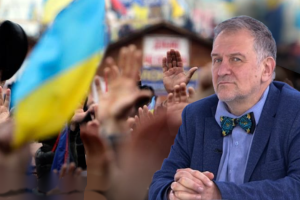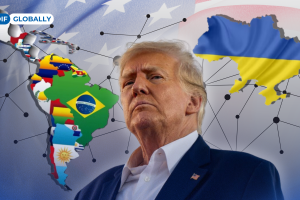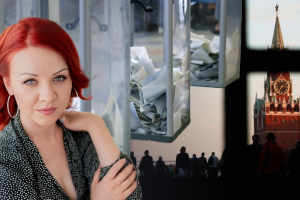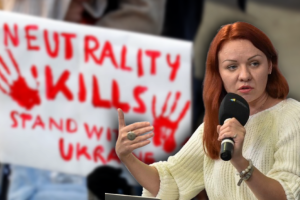This policy brief was prepared exclusively for "Rubryka"
International Developments
Ukrainian President Zelensky participated in the G7 summit in Hiroshima, Japan
Ukrainian President Volodymyr Zelensky appeared at the G7 meeting, seeking military and diplomatic assistance from allies.
Zelensky held two major rounds of meetings on Sunday, one with G7 leaders and the other with them and the invited guests, including India and South Korea representatives. He also spoke one-on-one with several leaders.
The G7 has vowed to intensify pressure on Russia, calling its assault on Ukraine "a threat to the whole world in breach of fundamental norms, rules and principles of the international community."
The group took a different approach in its comments on China. The leaders said they did not want to harm China and sought "constructive and stable relations" with Beijing. They also urged China to pressure Russia to end the war in Ukraine and "support a comprehensive, just and lasting peace."
The G7 leaders have rolled out a new wave of global sanctions on Russia, now the most-sanctioned country in the world, and plans to enhance the effectiveness of existing financial penalties meant to constrain President Vladimir Putin's war effort.
The latest sanctions aimed at Russia include tighter restrictions on already-sanctioned people and firms involved in the war effort. Over 125 individuals and organizations across 20 countries have been hit with U.S. sanctions.
PRC's Special Representative for Eurasian Affairs Li Hui visited Europe
During a visit to Europe, the Special Representative of the PRC for Eurasian Affairs Li Hui, reiterated that China has always maintained an objective and impartial position on the Ukraine issue and actively promoted talks for peace.
He made the remarks during talks with high-level European Union (EU) officials, including Frederic Bernard, head of Cabinet of President of the European Council, and Enrique Mora, deputy Secretary-General of the European External Action Service, in Brussels on 25 May.
The two sides exchanged views on the political settlement of the Ukraine crisis and China-EU relations.
Li said China and the EU share much consensus on this issue, adding that China supports the European countries to strengthen their strategic autonomy and make efforts for the long-term stability of the European continent.
The EU officials spoke highly of China's positive role in the peaceful settlement of the conflict. They appreciated the relevant principles in the document outlining China's position on the political settlement of the Ukraine crisis.
Ramstein Initiative's 12th session took place on 25 May
The 12th session of the Ramstein initiative was focused on three major topics:
- Strengthening Ukrainian air defense capabilities.
- Further preparations for the major Ukrainian counteroffensive in terms of (a) ammo supplies, (b) logistics and maintenance of Western military equipment, and (c) training of Ukrainian military personnel.
- Moving forward with an international aircraft coalition to support Ukraine with modern Western military fighter jets.
Denmark and Netherlands agreed to lead the European coalition of nations eager to start training Ukrainian fighter pilots to be capable of flying F-16s into combat missions.
The Netherlands also potentially agreed to provide Ukraine with a share of the nation's F-16s in close coordination with other participants of the international aircraft coalition.
Two weeks before the 12th Ramstein session Great Britain had announced the delivery of the "Storm Shadow" long-range cruise missiles to Ukraine in a significant move to bolster Ukrainian strike capabilities in the wake of the major Ukrainian counteroffensive.
London's move inspired France and Germany to consider providing Ukraine with the same type of missiles (French "Scalp" and German "Taurus") from the respective nations' military stockpiles.
War/Security Situation
Ukrainian Air Force successfully shot down a barrage of Russian "Kinzhal" missiles with US-made "Patriot" air defense system
During the massive Russian missile strike, Ukrainian Air Force used US-made "Patriot" air defense system to successfully shoot down 7 Russian "Kinzhal" hypersonic missiles (officially confirmed on 6 and 16 May).
As Russian military and political leadership grows uncertain about the details of the coming major Ukrainian counteroffensive and the ability of Russian forces to hold their positions, the Kremlin has reached out to its terrorist toolkit.
In an attempt to demoralize and maintain psychological pressure on Ukrainian citizens and leadership, Russian forces seem to fully return to their tactics of massive missile strikes against Ukrainian cities, with Kyiv being at the top of the target list.
Russia's Wagner group boasts it has taken Bakhmut
According to the Wagner Group leader Prigozhin, Russian forces have taken control of the Ukrainian city of Bakhmut.
Russian President Vladimir Putin offered his congratulations for "the completion of the operation to liberate Artemovsk," Russian state news agency TASS reported the Kremlin as saying, using the Soviet-Russian name for Bakhmut.
To the contrary, Ukraine has claimed it still controls parts of Bakhmut after Russian forces said they had finally captured the besieged eastern city.
The conflicting claims follow a months-long slog in the city where Russian soldiers have had to grind for every inch of territory.
Conclusions and Recommendations
- Ukrainian President Zelensky's appearance at the G7 leaders' summit in Hiroshima, Japan, is yet another symbolic political move to further consolidate Western allies' military and political support to Ukraine.
The G7 summit proved to be a landmark event solidifying key Western nations' will to maintain political pressure on Russia by discussing the potential widening of the anti-Russian sanctions against Moscow's nuclear energy and diamond trading companies – the two spheres virtually untouched by Western restrictions.
Another significant shift has been made with the decision to provide Ukraine with modern Western-made fighter jets – President Biden announced Ukraine is expected to receive F-16s from the international aircraft coalition after months of necessary training and logistics preparations.
Ukraine needs to intensify its efforts in coordinating its efforts with Western allies to
(a) boost anti-Russian sanctions efficiency, and
(b) speed up preparations to receive new weapon systems.
- The Special Representative of the PRC for Eurasian Affairs Li Hui's visit to Europe, including Ukraine and Russia, is yet another move by Beijing to try to play a central role as a political broker to settle the Russian-Ukrainian war politically.
The Chinese leadership is cautious in making any concrete moves. Beijing goes on with semi-public political consultations with the West to get as much understanding of Western nations' intentions and points of view on the war's finale as possible. PRC uses international trade issues as leverage to persuade the West to be bound to Russian demands disguised as a Chinese "peace plan".
In the meantime, the West tries to diversify its foreign trade priorities not to be too dependent on China – by negotiating a closer trade/manufacturing cooperation with India, for instance.
However, one of the Western priorities to keep China as far from close military and political cooperation with Russia remains.
Potentially this creates a situation where Russian leadership might no longer have a say at the negotiations table with all the peace plan architecture being finalized by the Brussels-Beijing tandem. This partly explains why Moscow once again rushes with its yet another "peace talks initiative".
- The 12th session of the Ramstein initiative was dedicated, first and foremost, to further boosting UAF's counteroffensive capabilities.
As Ukraine proves to be a reliable military partner to the Western allies by upholding the promise not to use Western weapons on Russian territory, the Ukrainian military also proves to be highly capable of using modern Western weaponry.
This potentially expands the range of military support Ukraine could (and should) receive to be not only capable of winning the war by driving Russian invasions forces from the occupied Ukrainian territories but also to have the resources and instruments needed to sustain further Russian threats in whatever form it might remain after the war ends.
The latest Ramstein session proved Western allies fully understand the current situation. They are politically prepared to move on as Ukraine receives long-range "Storm Shadow" cruise missiles (along with French and German commitments to provide their analogues) and prepares itself to receive the F-16 fighter jets after months of all necessary preparations.
- By shooting down seven Russian "Kinzhal" hypersonic missiles, the Ukrainian Armed Forces successfully destroyed another propaganda myth about the Russian army and its "unparalleled" top-notch technology.
Russia systematically used its boasted "military technological superiority" (both in conventional and nuclear forces) against the West as one of the main foreign policy tools to achieve its geopolitical objectives.
"Kinzhal" air-launched hypersonic missile was one of the cornerstones of the Kremlin's geopolitical militaristic propaganda as a "wonder-weapon" leaving the West virtually defenseless.
After the UAF used the US-made "Patriot" air defense system to shoot down successfully a Russian "Kinzhal" missile for the first time in history and then a barrage of six more, the West should rethink its defense potential and the hypersonic tech.
In turn, Russia needs to rethink its geopolitical strategy, at least for the short-to-medium period, as the Kremlin has already considered turning its hypersonic capabilities into the main instrument of its next nuclear strategic posture.
Ukrainian Armed Forces have gained valuable and unparalleled experience from the incidents and a clearer understanding of what the future air defense system should look like.
- Russian Wagner Group leader Prigozhin claimed his forces had completely controlled Ukrainian Bakhmut.
Bakhmut played an important strategic role in the coming offensive phase of the spring campaign.
Ukraine's objective was to divert and drain Russian forces that would have been used to strengthen Russian offensive capabilities in other locations. However, the continued defense of Bakhmut required Ukrainian authorities to make a prudent judgment of the cost-benefit balance for the town's garrison, which is independent of the political calculation and propaganda competition with the Kremlin.
Russia's objective was to seize Bakhmut to present it to its population as an "important victory" and prove that the war developed favorably despite significant losses.
Regarding the coming Ukrainian counteroffensive, the battle for Bakhmut has already played its strategic role in Ukrainian Armed Forces, denying Russians any additional offensive capabilities and diminishing their defensive posture.
The current situation of the Ukrainian military moving around the city to the South and the North presents further potential problems for Russian forces inside the city and the danger of being encircled.
It seems to be another move by Ukrainian military leadership in preparing for the coming major counter offensive operations against Russian forces.
______________________________________
This policy brief was prepared exclusively for "Rubryka" as part of a project "russia-Ukraine Conflict: from Full-Scale War to Conflict Resolution and Post-War Reconstruction" implemented in cooperation with the Razumkov Centre with the support of the MATRA program of the Embassy of the Netherlands. The opinions expressed are those of the author(s) only and should not be considered as representative of the Embassy's official position.








